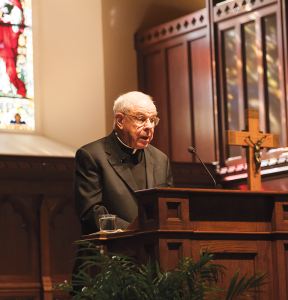
Rev. John W. Padberg, S.J., spoke at a lecture marking the 200th anniversary of the restoration of the Society of Jesus.
Rev. John W. Padberg, S.J., delivered a lecture in Dahlgren Chapel to mark the 200th anniversary of the restoration of the Society of Jesus on Thursday afternoon. Padberg delineated the history and evolution of the Jesuit community in the United States, and highlighted how the suppression of the Jesuits impacted the development of the society.
Padberg is director and editor of the Institute of Jesuit Sources in St. Louis, Mo., which has published numerous books on the history and spirituality of the Society of Jesus. From 1975 to 1985, he served as president of Weston Jesuit School of Theology, a national theological center in Cambridge, Mass. He also served as founding president of the international Conference of Catholic Theological Institutions.
The lecture was the first in a series of lectures that are planned to further address Jesuit history and spread its core values. Vice President of Mission and Ministry Fr. Kevin O’Brien, S.J., introduced the lecture, which he believes will foster a greater interest in faith on campus.
“We inaugurate the first of the many sacred lectures to come, on a range of topics which, as in days of old, construct and instruct and encourage our faith,” O’Brien said.
University President John J. DeGioia, who spoke at the event, emphasized the paramount significance that Jesuit values and history have on the Georgetown community.
“Without the persistence of the early Jesuits who endured suppression and the restoration, Georgetown would not be here and live to this day,” DeGioia said. “It is a privilege for Georgetown to be a part of this living, enduring tradition.”
In his lecture, Padberg highlighted the main reason for the suppression of the Society of Jesus in the late 18th century.
“Nationalists and regalists saw the Jesuits as an obstacle to establishing the church as an instrument of the state and subordinating it,” Padberg added.
Padberg discussed the three phases to Jesuit history — suppression, first informal phase of restoration and formal restoration. Suppression occurred mainly from 1759 until 1773, during which the Society of Jesus was outlawed and more than half the members of the society were dismissed. In 1814, the pope restored the Society of Jesus.
Although many Jesuits were suppressed, Jesuits today consider this period as an important stepping stone that placed the Society of Jesus on a path to spread their values farther than before.
“Suppression was good for us. It was good for us as a church,” assistant professor of history Rev. David Collins, S.J., said. “It transitioned us from a mission to a church.”
Archbishop John Carroll, S.J., the founder of Georgetown, lived among the few Jesuits after the suppression, He was disappointed by the status of the Society of Jesus in the United States and began forming groups and meetings to systematically organize a church and a society.
“A group of priests begin meeting in White Marsh, which is currently Washington, D.C. They tried to figure out what this new church would look like. They decided there to establish Georgetown and other educational institutions,” Collins said. “This is where everything started and began to expand.”
The informal restoration of the Jesuit society transitioned to a formal restoration in 1814. Conversations about how to organize and expand the Society of Jesus took place, and exiled Jesuits from Europe swarmed to America to help the cause.
“Suppression placed us on an apostle trajectory,” Collins said. “Suppression and restoration were among the best things that could have happened to us.”




















